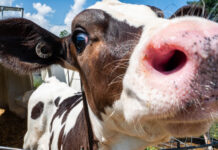For the most part, calls to the soil and water conservation district offices are pleasant. They are typically farmers with questions about a project, nature lovers calling about tree or fish sales, someone with questions about an upcoming program, and the occasional person looking to pay his water bill (sorry, that’s not us). But several times a year we receive the phone call that we dread — a livestock manure pollution complaint.
The Ohio Department of Agriculture has the authority over livestock pollution complaints through Ohio Revised Code Chapter 939. Through a cooperative agreement, SWCDs act as their agents to investigate and provide landowner assistance.
The complete law and procedures can be found online at the Ohio Department of Agriculture Division of Soil and Water Conservation. As you can imagine, it’s quite lengthy and your eyes will glaze over if I get into too much detail.
The bottom line is this: If any livestock manure gets into waters of the state (this includes roadside ditches), it is a violation of the pollution abatement law and subject to the associated penalties.
I’m a grizzled veteran around here and have seen many pollution complaints over the years. I grew up on a farm, and I know that stuff happens. I believe that farmers do not want to intentionally send pollution downstream, and I know managing livestock manure is not an easy task by any stretch.
Causes of complaints
Two scenarios leading to pollution complaints have repeated themselves over the years. The first is equipment or storage failure. Pumps don’t work, the automatic shut-off was overridden, or a hose broke while no one was watching. Sometimes the storage itself fails and the problem must be pinpointed, which is not an easy task.
Second, pollution incidents occur because a farmer does not have enough storage capacity to haul manure when field conditions are good, so he is forced to haul on wet or frozen and snow-covered fields. This is the case of our latest complaint.
Snow is always going to melt and depending on the rate, slope of the field and buffer area, the likelihood of manure entering a stream is high. No matter the reason for the failure, the operator is liable for the incident and subject to fines from any agency involved, which in addition to the Ohio Department of Agriculture may include the Ohio Division of Wildlife, and the Ohio Environmental Protection Agency. Fines of $15,000-$20,000 are not unheard of.
Best defense
Being proactive in the management of livestock manure is the best defense against a pollution complaint. Not changing livestock manure handling and expecting different results is just setting yourself up for failure.
Your local soil and water conservation district or natural resources conservation service office can assist with nutrient management planning. This will include an emergency plan identifying immediate temporary practices and phone numbers to call in the event of a spill.
Something as simple as constructing straw bale barriers around inlets, creating diversions or using pumps to oxygenate the stream show good faith effort to rectify the situation. Contacting your local SWCD office immediately when you have a spill instead of having a neighbor report it is a very good idea.
Complaints about agricultural pollution in Ohio can be reported to the division of soil and water conservation at 614-265-6610 or your local SWCD. Instead of answering the phone and hearing the dreaded pollution complaint, we’d love to talk to farmers about manure management plans.













